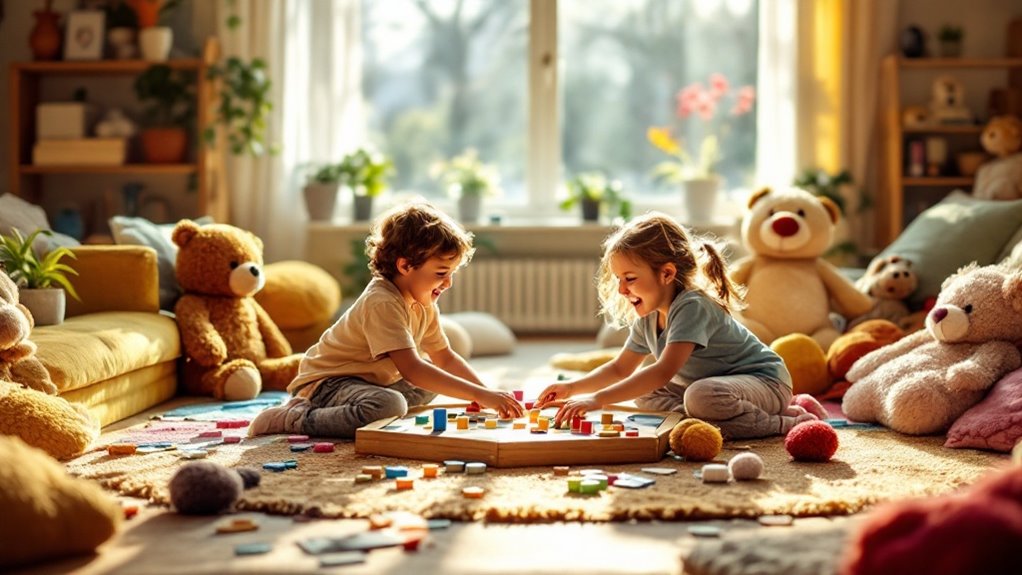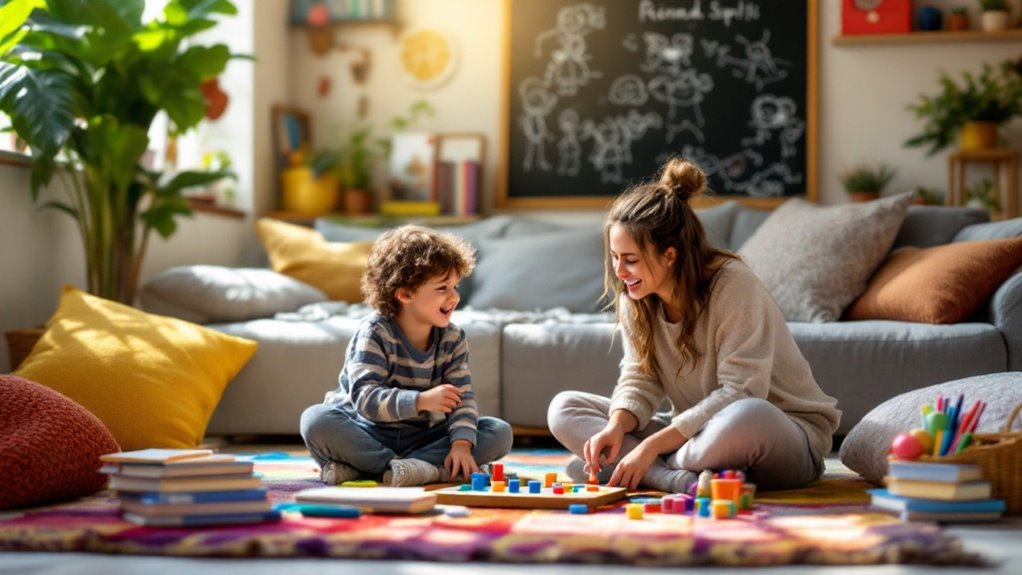Supporting your child's social skills development at home is essential for their overall growth and well-being. You can create an environment that encourages open communication, fosters empathy, and promotes teamwork. By incorporating various strategies, such as organizing playdates or engaging in role-play, you can help your child navigate social interactions more effectively. Each approach offers unique benefits that can greatly impact your child's ability to connect with others. So, what are some practical ways you can start implementing these strategies today?
Key Takeaways
- Foster open communication by encouraging your child to express thoughts and feelings in a safe environment.
- Organize playdates and group activities to provide essential peer interaction and practice sharing and cooperation.
- Use role-playing and games to simulate social situations, building confidence through practice in real-life interactions.
- Model positive social behavior by demonstrating kindness, active listening, and effective problem-solving in daily interactions.
- Engage your child in community projects and team sports to teach teamwork, empathy, and the importance of collective effort.
Encourage Open Communication

Open communication is essential for nurturing your child's social skills. When you create an environment where your child feels safe to express their thoughts and feelings, you encourage them to engage with others more effectively.
Start by actively listening to what they've to say. Show genuine interest in their stories and opinions—this builds trust and helps them feel valued.
Ask open-ended questions that prompt discussion. Instead of simply inquiring about their day, try asking what their favorite part was or if they faced any challenges. This approach not only deepens your connection but also teaches them how to articulate their feelings and thoughts clearly.
Encourage them to share their feelings about friendships and social situations. When they talk about their experiences, guide them in reflecting on those interactions. Help them identify what went well and what they might want to change next time.
Finally, model open communication yourself. Share your thoughts and feelings in appropriate ways, so they can see and learn how to express themselves.
Organize Regular Playdates
Regular playdates are a fantastic way to enhance your child's social skills in a fun and relaxed setting. By regularly organizing these gatherings, you create opportunities for your child to interact with peers, practice communication, and develop friendships.
Start by reaching out to other parents to set up a schedule that works for everyone involved.
During playdates, encourage your child to share toys, take turns, and resolve any conflicts that arise. You might also want to provide structured activities, like board games or arts and crafts, to help guide interactions. This approach not only keeps children engaged but also teaches them how to cooperate and collaborate with others.
It's essential to create a welcoming environment where your child feels comfortable expressing themselves. Make sure the atmosphere is relaxed, allowing for spontaneous play and conversation.
After each playdate, talk to your child about their experiences. Ask open-ended questions to help them reflect on what they enjoyed and what they learned.
Regular playdates can greatly boost your child's confidence and social abilities, setting a solid foundation for their future relationships.
Role-Play Social Scenarios

Role-playing social scenarios can be a powerful tool for developing your child's social skills. By simulating real-life situations, you help your child practice essential interactions in a safe environment.
Start by identifying common scenarios they might encounter, like introducing themselves, sharing toys, or resolving conflicts.
Next, set the stage by taking on different roles. You can act as the friend, a teacher, or even a stranger, while your child practices their responses. Encourage them to use eye contact, appropriate tone, and body language. If they struggle, gently guide them by offering suggestions or rephrasing their responses.
Make it fun! Use props or costumes to create a more engaging atmosphere. You can also record the role-play to discuss later, emphasizing what went well and areas for improvement.
Additionally, consider varying the scenarios. Include more challenging situations, like dealing with a bully or making new friends at a party. This not only builds confidence but also prepares them for real-world interactions.
Model Positive Social Behavior
Children learn a lot from observing those around them, so demonstrating positive social behavior is key. When you interact with others, whether it's family, friends, or even strangers, your child is watching and absorbing those interactions. Make a conscious effort to model kindness, respect, and active listening. For example, greet neighbors warmly or thank a cashier with genuine appreciation. These small actions reinforce the importance of treating others well.
Moreover, show your child how to express emotions appropriately. Instead of reacting negatively in stressful situations, demonstrate calmness and problem-solving. By handling conflicts constructively, you teach your child that disagreements can be resolved peacefully.
Encourage your child to join in these interactions. Invite them to help you with simple tasks like returning a library book or giving compliments. This not only reinforces the behavior but builds their confidence in social situations.
Foster Empathy Through Stories

One effective way to foster empathy in your child is through stories. Reading books or sharing tales that highlight diverse experiences allows your child to step into someone else's shoes. When you discuss characters' feelings and motivations, you help your child understand different perspectives. Ask questions like, "How do you think they feel?" or "What would you do in their situation?" This encourages deeper thinking about emotions and actions.
You can also choose stories that feature themes of kindness, friendship, and overcoming challenges. These narratives can spark meaningful conversations about real-life situations your child may encounter. By relating the stories to their own experiences, you reinforce the idea that everyone has unique feelings and backgrounds.
Additionally, consider storytelling as a shared activity. Encourage your child to create their own stories that reflect their feelings or experiences. This not only boosts their creativity but also promotes self-awareness and empathy towards others.
Ultimately, stories are powerful tools that can shape your child's understanding of the world. By incorporating them into your daily routine, you nurture their ability to empathize, connect, and grow as socially aware individuals.
Limit Screen Time Interaction
While technology can offer valuable learning opportunities, it's crucial to limit screen time interaction to foster your child's social skills. Excessive screen time can hinder their ability to engage in face-to-face conversations and develop meaningful relationships.
By setting healthy boundaries around technology use, you'll encourage your child to explore real-world interactions that enhance their social capabilities.
Here are a few strategies to help you limit screen time:
- Establish a Routine: Create a daily schedule that includes specific times for screen use, ensuring your child knows when it's time to unplug and engage with others.
- Encourage Outdoor Play: Promote physical activities and outdoor playdates with peers, allowing your child to practice social skills in a natural setting.
- Model Healthy Behavior: Demonstrate balanced screen use yourself. Engage in conversations and activities without screens to show your child the importance of being present with others.
Teach Conflict Resolution Skills

Frequently teaching conflict resolution skills can greatly enhance your child's ability to navigate social situations. Start by explaining what conflict is and why it's important to resolve it peacefully. Encourage your child to express their feelings assertively, not aggressively. Teach them phrases like "I feel" statements, which can help articulate emotions without blaming others.
Role-playing can be an effective way to practice conflict resolution. Set up scenarios where disagreements might occur, such as sharing toys or deciding on a game. Guide your child through the steps of identifying the problem, discussing feelings, brainstorming solutions, and agreeing on a resolution. This not only builds their confidence but also equips them with practical skills.
Make it a point to model good conflict resolution in your own interactions. Children learn a lot by observing adults, so demonstrate how you handle disagreements calmly and respectfully.
After a conflict is resolved, discuss what worked well and what could be improved next time. Reinforcing these skills consistently will help your child feel more prepared to handle conflicts independently, fostering their overall social development and emotional intelligence.
Engage in Group Activities
Engaging in group activities can greatly enhance your child's social skills, as these experiences provide opportunities for collaboration and communication.
When kids participate in group settings, they learn to express themselves, listen to others, and work towards common goals. This not only builds their confidence but also helps them understand different perspectives.
To effectively foster your child's social skills through group activities, consider the following:
- Playdates: Organize regular playdates with peers to encourage informal interaction and relationship-building.
- Team Sports: Enroll your child in team sports where they'll need to cooperate, strategize, and communicate with teammates.
- Community Projects: Get involved in community service projects as a family to teach teamwork and the importance of contributing to a cause.
Promote Teamwork Through Games

Playing games is a fantastic way to promote teamwork and strengthen your child's social skills. When you choose games that require collaboration, your child learns the importance of working together toward a common goal. Board games like "Pandemic" or "Forbidden Island" encourage players to strategize as a team, fostering communication and problem-solving skills.
You can also explore outdoor games like capture the flag or relay races, where kids must coordinate their efforts to succeed. These activities not only build teamwork but also help them understand the value of supporting one another.
If you prefer something simpler, cooperative video games can also encourage teamwork, as players navigate challenges together.
Set aside regular game nights to make this a fun and consistent part of your family routine. Encourage your child to express their thoughts and listen to others, reinforcing good communication habits.
Set Up Family Discussions
Encouraging open dialogue at home can greatly enhance your child's social skills. Family discussions create a safe environment where your child can express thoughts and feelings. By engaging in these conversations, your child learns to communicate effectively, listen actively, and respect differing opinions.
To set up effective family discussions, consider the following tips:
- Choose a Regular Time: Establish a consistent schedule, like a weekly dinner or weekend gathering, to foster routine in communication.
- Select Engaging Topics: Pick subjects that interest everyone, such as current events, family vacations, or personal experiences, to spark meaningful conversations.
- Encourage Participation: Make sure everyone has a chance to speak. You might use a talking stick or designate a time limit to keep discussions balanced.
With these strategies, you'll help your child develop essential social skills like empathy, negotiation, and conflict resolution.
Over time, these discussions won't only strengthen family bonds but also empower your child to engage confidently in social situations outside the home.
Key Takeaways for Supporting Your Child's Social Skills at Home
By weaving these strategies into your daily routine, you're not just nurturing your child's social skills—you're planting seeds for lifelong friendships and connections. Each conversation, playdate, and role-play is a stepping stone to building their confidence and empathy. Remember, as you guide them through the maze of social interactions, you're lighting the path for a brighter, more connected future. So, let's get started on this journey together, one step at a time!

